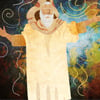The Talmud explains that with the death of the latter prophets Chagai, Zechariah and Malachi at the very beginning of the Second Temple era, “the spirit of prophecy departed.”1 Why did that happen?
Maimonides: Lack of Joy
The Talmud states, “Prophecy does not come upon a prophet when he is sad or languid.”2Maimonides (1105-1204) in his Guide for the Perplexed explains that every faculty of a person's body at times grows weak and at other times is healthy. The “imaginative faculty,” through which the prophet receives prophecy, is no different than the other faculties. Prophets were thus unable to prophesy when they mourned, were angry, or were similarly affected, as can be seen with Jacob when he mourned Joseph’s perceived death. This, Maimonides explains, is the “primary reason” why prophecy ceased during the time of exile. For what could bring a person to sadness more than being in servitude to sinful nations?3
Although prophecy departed at the beginning of the Second Temple period, when the Jewish people were technically not exiled, they were beholden to foreign governments.
Wickedness
Others disagree with Maimonides’ designation of prophecy as a mere “faculty of the body.”4 Instead, it is seen as a divine gift. Thus, on an individual level, “prophecy does not rest amidst sadness,” but prophecy does not rest on the nation as a whole due to the wickedness of their deeds. As G‑d says about such a time of spiritual failings, “I hid My face from them.”5
Prophecy: Counterbalance to Idolatry
On a more positive note, Rabbi Judah the Pious (1150-1217) explains that the spirit of prophecy departed during the Second Temple and subsequent exile (which we are still in) because the passion toward idolatry had ceased. In earlier times, when the idolatrous priests were performing wondrous feats, if G‑d’s prophets wouldn’t have countered them with miraculous feats, all would have turned toward idolatry. However, since idolatry is no longer much of a temptation, there is no longer a need for prophets.6
Did Prophecy Really End?
At first glance, the statement that the spirit of prophecy departed “with the death of the prophets Chagai, Zechariah and Malachi” seems to contradict many other traditions.
We find numerous accounts of sages who were able to perceive beyond that which the eye can see with the divine spirit, such as Rabban Gamliel,7 Rabbi Akiva,8 Rabbi Meir,9 and Rabbi Shimon Bar Yochai.10
As late as the medieval times, we find a number of rabbis, such as Rabbi Ezra the Prophet (Moncontour, France, c. 1230)11 and Rabbi Shmuel the Pious (Speyer, Germany, 12th century),12 who were given the appellation “prophet.” In fact, Maimonides himself, whose explanation for the departure of prophecy was quoted earlier, attests that a contemporary of his predicted a number of future events, which “proved to all that he was most definitely a prophet.”13
So what are we to make of the Talmudic pronouncement that prophecy has departed?
If we read the Talmud carefully, we note that it uses the term “departed” rather than “ceased.” For, in truth, prophecy never totally left; rather, it was no longer as commonplace as it had been in earlier generations. Yet, there remained exceptional individuals who did experience prophecy, albeit not on the level of biblical prophets.14
Preparing for the Messianic Era
The Rebbe, Rabbi Menachem M. Schneerson, of righteous memory, explains that this is a crucial step in readying the world for the messianic era. During the age of the biblical prophets, there were wondrous miracles, but the effect on one who witnessed such revelations wasn’t necessarily internalized and lasting. Whatever spiritual awakening came about was almost forced by the magnitude of the revelation.
The Second Temple period, when open miracles and prophecy were diminished, was a time for the Jewish people to mature and come close to G‑d—not from some sort of imposed revelation, but rather from within their own selves. The same can be said, to an even greater degree, about the time of exile—without revelations, we must seek out a connection with G‑d, which comes from a deeper place within ourselves.
On the other hand, although witnessing prophecy has the shortcoming of being an “imposed” spiritual awakening, it does have the benefit of being a powerful, tangible experience of G‑d’s eminence.
These two stages are a preparation for the messianic era, when both of these aspects will be combined. On the one hand, we will experience palpable wonders and prophecy with all of our senses. But at the same time, our connection to the divine will be a natural, unimposed experience.
As the prophet Joel proclaims,15 “And it shall come to pass afterwards that I will pour out My spirit upon all flesh, and your sons and daughters shall prophesy . . .”16
May it be speedily in our days!






Join the Discussion